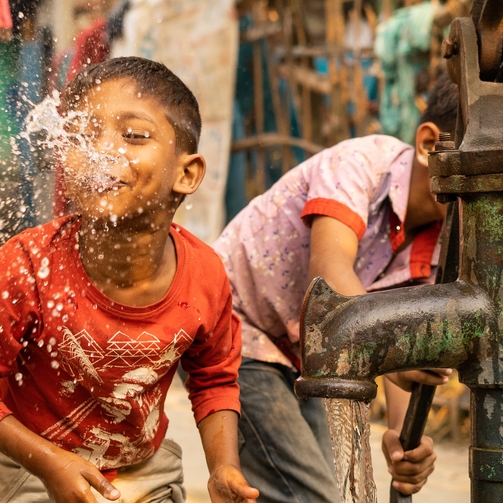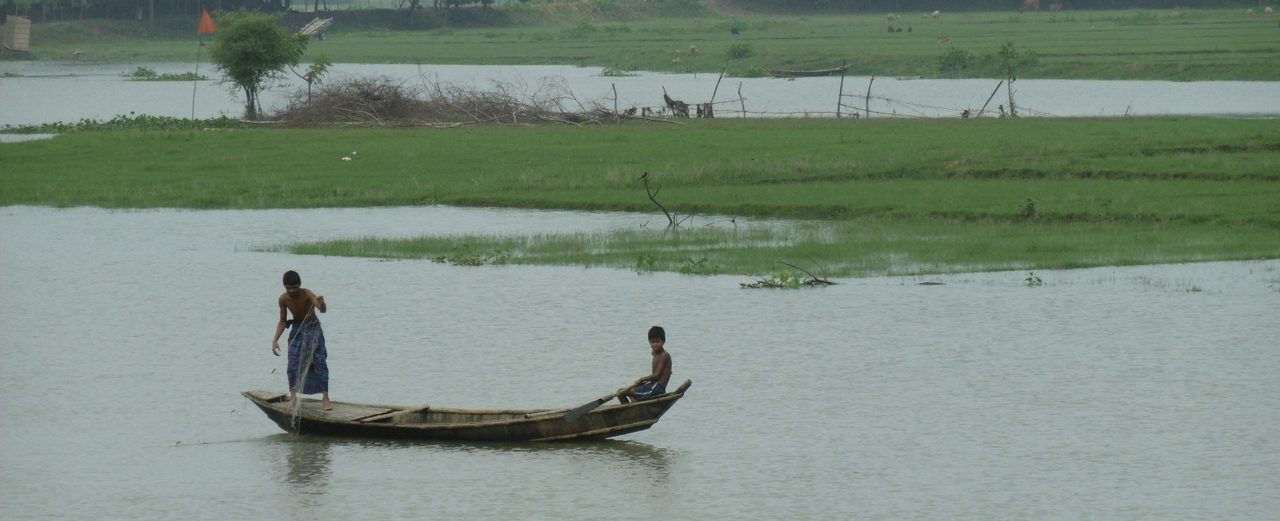 Sparkling life - Indispensable
Sparkling life - Indispensable
Access to clean drinking water
Flying to the capital Dhaka during the rainy season, you would not think that Bangladesh could suffer from a lack of water. The flooded rice fields start right next to the runway. When it comes to water, the country can claim a number of superlatives. For example, it has the largest river delta in the world, the Ganges delta, into which the muddy waters of the three largest rivers on the Indian subcontinent flow. For 3 to 4 months of the year, 60 per cent of the country's surface area is flooded. Then the monsoon rains swell the rivers and roll through the land in streams that are sometimes kilometres wide. Valuable sediments are deposited in the soil, giving the country three harvests a year. Nevertheless, the people who live in the rivers on the alluvial islands often have little access to clean drinking water.
Necessity
Clean drinking water for families on the alluvial islands in Bangladesh.
Activity
The MATI association buys material for drilling wells and installing water pumps that the families then install and use.
Countable effort
Number of families that have access to clean drinking water.
Result
The families are given access to clean drinking water, reducing diseases such as diarrhoea and skin conditions.
Systemic effect
The health of the families and people in general improves and child mortality is reduced.
Background
Surrounded by water - and still without clean drinking water. This situation is the reality of the families settling in the Brahmaputra Char basin on the alluvial islands. The population pressure in Bangladesh is enormous. 157 million people live in an area less than half the size of Germany. This forces above all the poor population to erect their huts where no one else claims the land - in the riverbed. According to the World Bank (2016), 51 per cent of the population in the Mymensingh district live below the poverty line, while surveys conducted by the organisation MATI e.V. show that over 80 per cent of the population live in the alluvial region. The income that these families can earn is very low. Especially in those cases when the river reclaims the space and there is no harvest. Many families have to live with two meals a day. The families then fetch the drinking water from ponds or from the river, where they also shower, wash their clothes, dishes and cows, and often also defecate. The results are diarrhoea and a very high rate of typhoid fever and cholera infections. If one compares the health data with those of families who have a water pump, one quickly sees that clean water is crucial for good health.
The good deed
Your good deed provides access to clean drinking water for families on the alluvial islands. They receive water pumps that are shared among neighbouring families. As part of the good deed, the MATI association will provide the material for the families: pipes, iron pump heads and bamboo poles. Under guidance and training, the villagers will install the pumps manually. Traditionally, several related families share a courtyard. These community courtyards have therefore come to an excellent agreement to build pumps for several families. One pump can supply at least 15 people with clean drinking water. The families become members of a savings group and set aside 0.50 euros per family for repairs to the pump. Thus the drinking water supply is also secured in the long term.

AboutBangladesh
Dhaka
164,700,000
3,677
Placed 136 of 189
About 80 per cent of rain in Bangladesh falls during the monsoon from May to the middle of October. Bangladesh is home to the largest contiguous mangrove forest in the world.
About the organization and further information
MATI e.V.
Website





